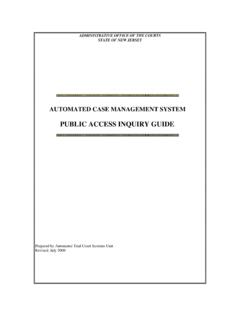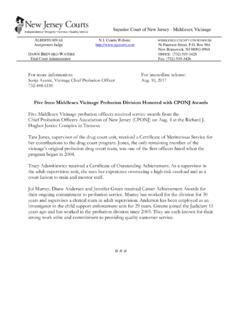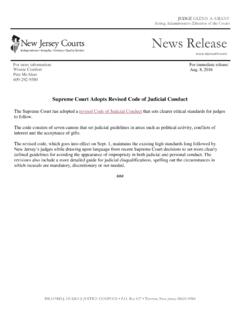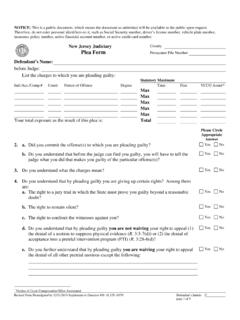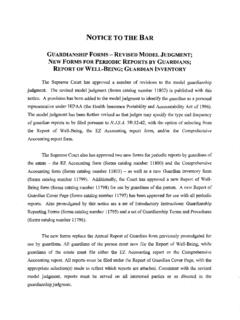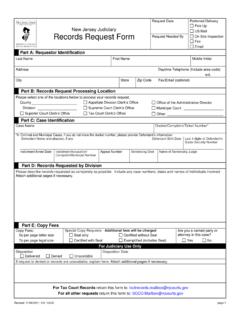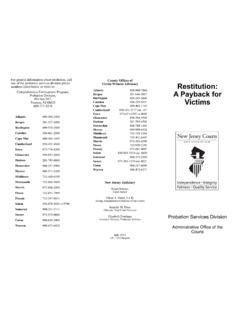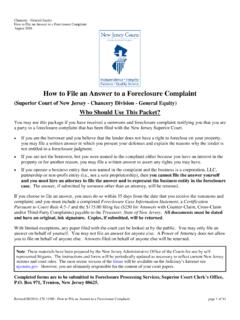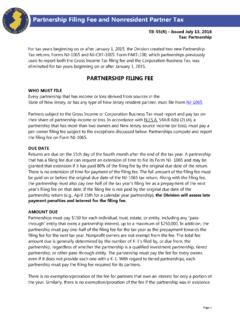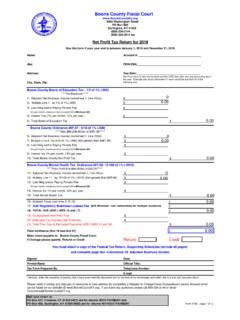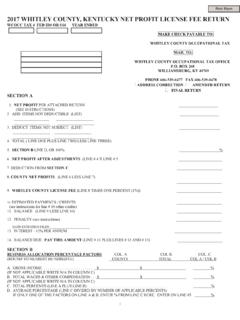Transcription of Special Civil - A Guide to the Court
1 New Jersey Judiciary Special Civil A Guide to the Court Superior Court of New Jersey Law Division Special Civil part Special Civil A Guide to the Court Revised 04/2018, CN 10281 page 1 Special Civil is a Court of limited jurisdiction in which you may sue a person or business (the defendant) to collect an amount of money up to $15,000 that you believe is owed to you. If your claim is $3,000 or less, [$5,000 in the case of a tenant s security deposit], you may sue in the Small Claims Section; please refer to the Small Claims brochure. This brochure explains how to file a complaint, how to answer a complaint, how to file an appeal and gives general information about Special Civil part . It is not intended to provide or take the place of legal advice or to answer every question you have about this Court . For legal advice about your rights, you should contact a lawyer.
2 If you do not have a lawyer, you may contact the Lawyers' Referral Service of your County Bar Association. If you cannot afford a lawyer, you may contact the Legal Services Program in your county to see if you are eligible for free legal services. Special Civil Special Civil is one of three sections of the Superior Court 's Special Civil part . The other two sections are Landlord/Tenant and Small Claims. ( Separate brochures are available for these sections.) Special Civil is limited to cases in which the demand is $15,000 or less. If you believe you are entitled to recover more than $15,000, your case should be filed in the Civil part of the Law Division of the Superior Court . If you believe you are entitled to damages greater than $15,000, but still wish to sue in Special Civil , you give up your right to recover damages over $15,000. The additional money cannot be claimed later in a separate lawsuit.
3 Typical Claims Filed Following is a general list of claims that may be filed in Special Civil : A person or business did not comply with a written or oral contract. Return of money used as a down payment. Property damage caused by a motor vehicle accident. Damage to or loss of property. Consumer complaints for defective merchandise or faulty workmanship. Payment for work performed. Claims based on bad checks. Return of a tenant's security deposit. Illegal or wrongful eviction, writ of possession, etc. ( Special actions require Special forms available at any Clerk s Office) Where to File a Complaint A complaint must be filed in the Office of the Special Civil part in the county where at least one defendant lives or where the defendant s business is located. A business defendant is considered located in a county wherever it is actually doing business or in the county where its registered office is located.
4 If there is more than one defendant, the complaint can be filed in the county where any of the defendants live or are located. If none of the defendants live or are located in New Jersey, the complaint must be filed in the county where the cause of the action arose or where it started. If you are suing for the return of a security deposit, you can also file in the county where the rental property was located. Special Civil A Guide to the Court Revised 04/2018, CN 10281 page 2 Who May File a Complaint To sue in the Special Civil part , a person must be 18 years of age or older. If the person suing is under the age of 18, the claim must be filed by a parent or guardian. A plaintiff or defendant that is a corporation, partnership, limited liability company, etc., must be represented by an attorney when the claim or counterclaim is greater than $3,000.
5 An officer, trustee, director, agent or employee of a corporation may present or defend against a claim of $3,000 or less. Filing a Complaint [A pro se packet containing the Special Civil complaint and summons form is available from any of the Special Civil part Offices in New Jersey and is available on the Internet at ] The complaint can be filed through the mail or in person. When filing a complaint, you, as the plaintiff, must: Give your full name, address and telephone number. To ensure proper service of the complaint, give the correct name(s) and address (es) of the person(s) named as the defendant(s) in the complaint. It is important that the defendant be properly identified as an individual, a sole proprietorship, a partnership or a corporation. State the amount of money you are suing for. State the reason why the defendant owes you money.
6 State whether there is, at this time, another case involving both you and the other party(ies) and, if so, the name of the Court . Sign and date the completed form. Pay the correct filing and service fees when filing the complaint with the Office of the Special Civil part . If you pay less than what is required, it will be returned to you. Do not provide the Court with any party s social security number, driver s license number, vehicle plate number, insurance policy number, active financial account number or active credit card number. Submit this information only if it s required by law, Court order, rule or administrative directive. Don t redact this information from your originals. Submit the last 4 digits of the active financial account information only if it is the subject of the litigation and cannot otherwise be identified. After you have filed a complaint, a trial date will not be set unless the defendant forwards an answer in writing along with the proper fees to the Office of the Special Civil part within 35 days from the date the complaint was served upon that defendant.
7 If the defendant responds in writing within the 35 days, a trial date will be scheduled. All parties will be notified by the Court . If a defendant does not respond within the 35 days, the Court will enter a default. The plaintiff must apply for the entry of a judgment by default within 6 months from the date that default was entered or they must file a motion in order to obtain the judgment by default. Through a judgment by default, the Court decides the amount of money, if any, to be awarded to a plaintiff because the defendant did not answer the complaint in time or come to Court . You are required to submit an affidavit and other documents verifying the amount of your claim and prove to the Court that the individual defendant is not an active member of the military. Proof of military service does not apply to business defendants. A hearing may be held in Court to allow you to prove your claim where the amount you claimed cannot be proved from your documents.
8 [A pro se packet on how to apply for a default judgment is available in any New Jersey Special Civil part Office and is available on the Internet at ] Special Civil A Guide to the Court Revised 04/2018, CN 10281 page 3 If the complaint is for money damages caused by a motor vehicle accident and the judgment requires a defendant to pay $500 or more, the defendant must pay within 60 days. If the defendant does not pay within the 60 days, the plaintiff may request through the Office of the Special Civil part that the New Jersey Motor Vehicle Commission stop the defendant's driving and registration privileges until the judgment is paid. Filing Fees for a Complaint The costs for filing a complaint in Special Civil are: $50 for a complaint where the amount claimed is $3,000 or less. $75 for a complaint where the amount claimed is more than $3,000.
9 $5 for each additional defendant. Currently the fee is $7 for each defendant served by certified and regular mail. This is subject to change, however. [A $3 fee, plus the Court officer s applicable mileage, is charged for one defendant if the complaint is served personally by a Court officer. Each additional defendant that you may want a Court officer to personally serve is another $5 fee plus applicable Court officer mileage.] Staff of the Special Civil part Court can inform you of the mileage fee. Make a check or money order payable to the Treasurer, State of New Jersey. An additional $100 fee is required for requests for a jury trial by six jurors. If you cannot afford to pay the filing fees, you may apply to the Court to qualify as an indigent and your filing fees may be waived by the judge. Filing an Answer to a Complaint If you have been named as a defendant in a case, you must file a written answer to the complaint with the Office of the Special Civil part in the county in which the complaint was filed within the number of days stated in the summons (35 days if you reside or are located in New Jersey; 35 days if you reside or are located out of state).
10 You also must hand deliver a copy of the answer or send by regular and certified mail to the plaintiff or send by regular mail to the plaintiff s attorney. [A pro se answer packet with accompanying instructions is available in any New Jersey Special Civil part Office and is available on the Internet at ] If you believe that the plaintiff owes you money, you must add a counterclaim to the answer. If you believe that someone else named as a defendant in the complaint owes the money, you must add a cross claim against that defendant to the answer. You must serve the co-defendant(s) with your cross claim. Finally, if you believe that a party not named in the complaint owes the money, you must add a third party complaint to the answer. The Court will serve the new party you are adding to the case and you MUST pay for this service, as outlined above.
